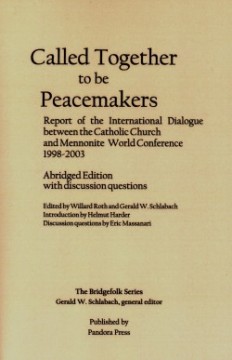 In 2003, theological exchange between Mennonites and Roman Catholics marked a historic milestone as delegations to the first international dialogue between representatives of Mennonite World Conference and the Pontifical Council for Promoting Church Unity released a final report summarizing their five years of conversation. “Called Together to be Peacemakers” (available at http://www.bridgefolk.net/theology/dialogue) offers a common narrative of watershed events in church history especially during the 16th and 4th centuries. It explores theological perspectives that the two traditions both share and dispute concerning the nature of the Church, sacraments/ordinances, and peacemaking. It closes with mutual confessions of repentance for past violence and recrimination, thus inviting a “healing of memories.”
In 2003, theological exchange between Mennonites and Roman Catholics marked a historic milestone as delegations to the first international dialogue between representatives of Mennonite World Conference and the Pontifical Council for Promoting Church Unity released a final report summarizing their five years of conversation. “Called Together to be Peacemakers” (available at http://www.bridgefolk.net/theology/dialogue) offers a common narrative of watershed events in church history especially during the 16th and 4th centuries. It explores theological perspectives that the two traditions both share and dispute concerning the nature of the Church, sacraments/ordinances, and peacemaking. It closes with mutual confessions of repentance for past violence and recrimination, thus inviting a “healing of memories.”
A group of Bridgefolk volunteers has now collaborated with Pandora Press to publish a study version of this watershed document suitable study in a variety of settings. The text has been abridged. Helmut Harder, co-chair of the international dialogue, provides an introduction. Discussion questions and other tools are designed to give maximum flexibility to different kinds of study groups.
Some groups will commit themselves to in-depth study. Others will want to familiarize themselves with Mennonite / Catholic dialogue, but have limited time. Many will come with specific interests in peacemaking, local Christian cooperation or worship and spirituality. Some will have designated leaders and others will pass around leadership of their discussions. Three features allow study groups to tailor their preparation, reflection and discussion:
- The appendix at the end of the book offers study plans of various length and focus, along with additional suggestions.
- Discussion questions appear throughout the document, near relevant paragraphs.
- Paragraph numbers from the full original document are retained for groups and individuals who wish to study more thoroughly, or for leaders seeking background.
Please consider using this resource in your congregation, parish or classroom. Or better yet, use it as an opportunity to carry on a Mennonite-Catholic dialogue in your local setting. Bulk rates are available.
Click here to order individual copies. Or write to Pandora Press (bookshop@pandorapress.com) for bulk orders.
from the back cover:
Called Together to be Peacemakers, the report of the International Mennonite-Catholic dialogue, is aimed at fostering a healing of memories. We are therefore delighted to see that the report is being used by Mennonites and Catholics in different localities. Although this abridged version has no official status, it will no doubt help to make the Report even more accessible.
This abridged version nicely summarizes perspectives found in the full report, At the same time the readers will be aware that they can get to the original in order to find the fuller expression of Mennonite and Catholic perspectives on the issues treated.
We hope that Called Together to be Peacemakers helps to foster new and closer relations between Catholics and Mennonites, and other Christians as well.
Larry Miller
Mennonite World Conference
John A. Radano
Pontifical Council for Promoting Church Unity


 The first two volumes in the new Bridgefolk Series are now off the press. They are the results of the Mennonite Catholic Theological Colloquium, which was convened four years ago by Bridgefolk leaders Gerald Schlabach and Ivan Kauffman to stimulate conversation between Mennonite and Catholic theologians on the major issues then being discussed by the International Mennonite Catholic Dialogue.
The first two volumes in the new Bridgefolk Series are now off the press. They are the results of the Mennonite Catholic Theological Colloquium, which was convened four years ago by Bridgefolk leaders Gerald Schlabach and Ivan Kauffman to stimulate conversation between Mennonite and Catholic theologians on the major issues then being discussed by the International Mennonite Catholic Dialogue. The lead paper in the
The lead paper in the